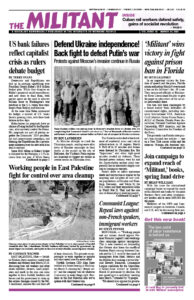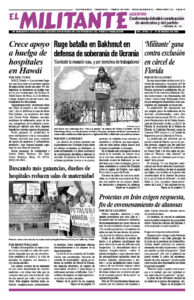After tens of thousands took to the streets in Tbilisi, the capital of Georgia, the country’s ruling party backed off its plans to impose a law that would curtail political rights and limit freedom of the press.
Protesters say the bill was modeled after a 2012 Russian “foreign agents” law that allowed the Kremlin to ban unions and political organizations if they failed to declare receiving funds from abroad. The law was expanded after Moscow’s invasion of Ukraine to target any media outlet, journalist or individual Russian citizen opposed to the war. Similar laws have been passed by pro-Moscow governments in Belarus, Tajikistan and Azerbaijan.
Lawmakers from Georgian Dream, the ruling party, deny the draft law was based on Russia’s, arguing that it was modeled on the U.S. government’s Foreign Agents Registration Act. That measure is also used to frame up political opponents, in this case by the rulers in Washington.
The Georgian government says it wants to join the U.S.-led NATO alliance. Days after Moscow’s invasion of Ukraine it applied for membership in the European Union, along with the governments of Moldova and Ukraine.
The mood was festive outside of Georgia’s parliament in Tbilisi after the government announced it had withdrawn the bill. “This is a victory. We won thanks to our unity,” student Irina Shurgaia told Agence France-Presse.
Thousands had gathered for days after legislators took the first steps toward passing the measure. Police attacked protesters with tear gas and water cannons and arrested 77 people. The next day thousands gathered in front of parliament, chanting “No to the Russian law!”
Protests were also held in Batumi, Georgia’s second-largest city.
Moscow invaded Georgia in 2008 and still occupies part of the country.
In the early 1990s the Kremlin backed pro-Moscow separatists in the regions of Abkhazia and South Ossetia. The 2008 invasion resulted in the ethnic cleansing of Georgians in the two regions, which include about 20% of the country’s territory. The Kremlin continues to station troops there.
Russian Foreign Minister Sergei Lavrov slandered today’s Georgian protesters claiming their actions were “being orchestrated from abroad.”
Georgia was seized and annexed by Russia’s czarist rulers in 1801. Following the Bolshevik-led Russian Revolution in 1917, its workers and farmers government freed Georgians and other oppressed peoples from the czarist boot, guaranteeing their right to self-determination — the first government to ever do so. This conquest was reversed when workers and farmers were driven from power during a counterrevolution headed by Joseph Stalin.
Georgia declared independence again in 1991 when the Stalinist regime collapsed.
There is widespread opposition in Georgia to Moscow’s invasion of Ukraine. Thirty thousand people turned out in Tbilisi to protest when Moscow invaded last year. Over 100,000 Russians fled to Georgia since the war began and now live there. At the war’s one-year mark, Feb. 24, tens of thousands marched again, carrying Ukrainian flags and anti-Putin signs. Among them were thousands of the Russians who had fled.
Many held signs like “No to war,” “12 months of Russian terror in Ukraine” and “Putin is not the motherland.”

